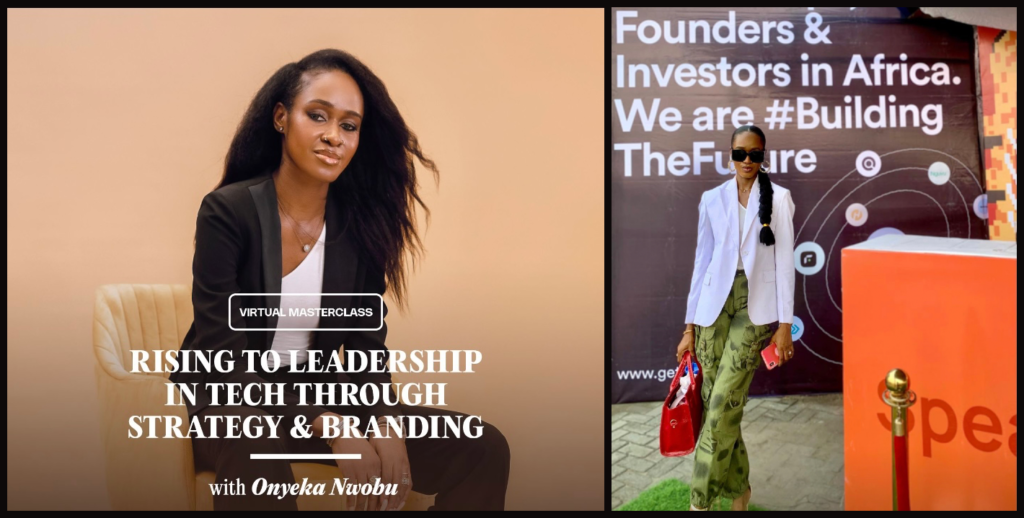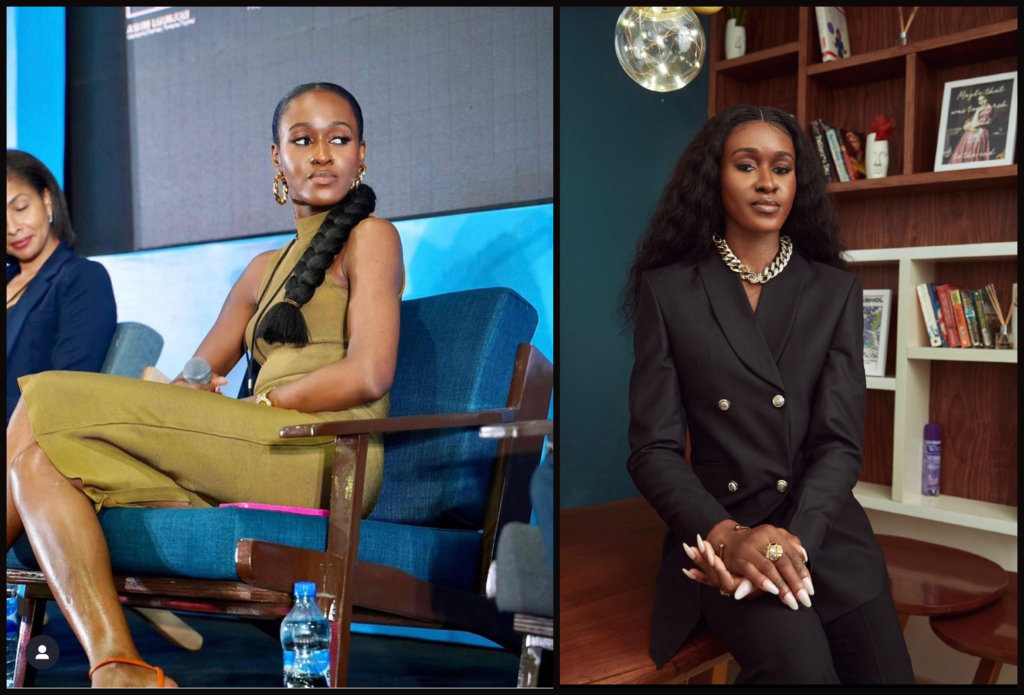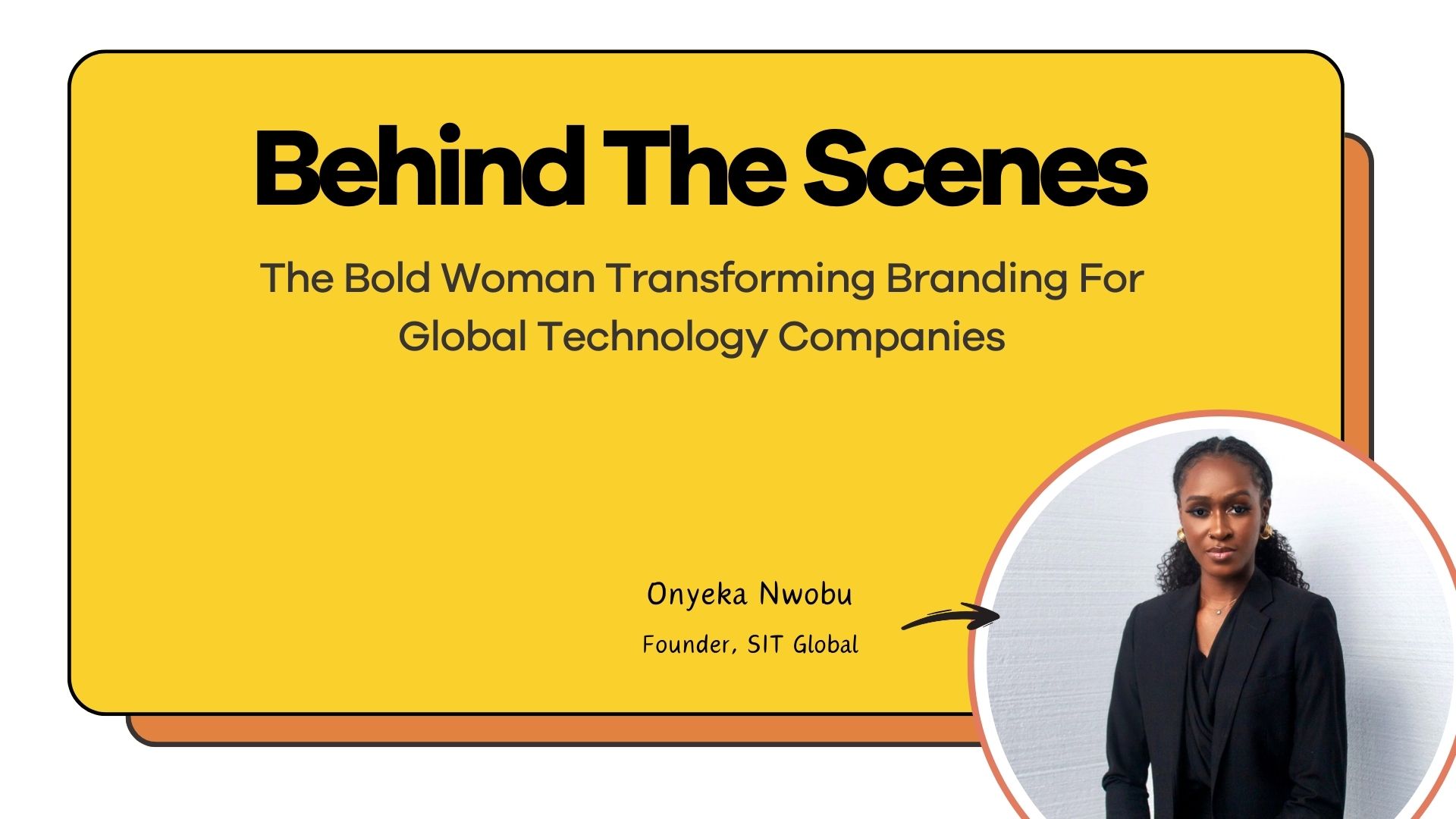Welcome to another episode of Behind The Scenes. This time we brought in Onyeka Nwobu, Founder and Director of SIT Global and a leading advocate of branding as a tool for business development across industries. From fashion to finance, agriculture and currently, the technology space, Onyeka has been both in front and behind the camera moving the needle for brands like SendStack (increasing its revenue by $150,000), GT bank and others throughout her career journey.
If like many, you never really understood what branding is about or didn’t know it could have a downline effect on increasing awareness, brand loyalty, sales and revenue, you will by the time you’re done reading this.
In this episode of BTS, you will have a peek at what goes on in the life of a brand strategist, the reality of the relationship between the Nigerian technology industry and branding, and most importantly, what plays out behind the scenes.
P.S: If interviews are not your thing, here’s something we think you will love
Customer service: A Tool for Customer Acquisition and Retention
Let’s meet Onyeka>>>
When you pull away the curtains, who is Onyeka Nwobu?
I am an introvert, this is something a lot of people don’t know. I’m a free spirit and a homebody and that might seem off because, in branding, people expect that you look put together and sound smart but I don’t care so much for that especially because intelligence is not something you can take from me. I love God, I love nature and I love people.
You must have gotten several interviews. What’s one question you wish people would ask more often?
Uh… “How’s my heart?”
Okay, how’s your heart Onyeka?
(She laughs) Oh, good one. I woke up today realizing that I had hit such a huge milestone. Last year, I was a bit frantic and it sent me down on such a downward spiral that I ended up creating a solution out of it. And that solution works, so I’m at peace.

You’ve worked in the finance industry and for top players like GT Bank, and First Bank. What’s peculiar about that industry for brand strategists?
So I’ll come at this from what is peculiar about the industry to me. I think one interesting thing is how although they are in the finance space, the companies were willing to explore narratives beyond finance. It wasn’t just about finance, especially during my time at GT Bank. I mean, I did fashion and food.
You could see that a lot of thinking went into that. When you break it down, you’d realize that they went into what are the most basic needs of their customers (food, shelter, clothing) and they explored that.
Another thing is that it gave me “big-budget energy”
Oh wow…
Yeah and that’s something working in the startup industry now, I find that there’s a disparity. But basically in finance, the top guys don’t think basic. You have to have a big mind to play in finance and that resonated with me.
Your career trajectory has gone through fashion, finance, and now the startup industry, which stands out as more welcoming for brand strategists looking to grow a career?
I wouldn’t say I’m in the startup industry. I’m in education and I play in the technology space which is very versatile. startup tech was my first leg into the technology industry. The most welcoming industry for a brand strategist is finance, even though I’ll put it as corporate. The big players have hacked it when it comes to brand and strategy but in the startup space industry, it’s not eating as much just yet and I’m unsure as to whether people are just refusing to see it.
For the tech industry, would you say finance is a major reason they’re not branding-inclined?
Oh no, I think ignorance is the biggest factor and I don’t say this disrespectfully. Ignorance means people don’t know and that’s how I found myself in the education sector. Branding is not about money. I and my sister built frugirls, took it to international heights and we started with zero naira. It’s not all about money but it does take a load of effort. This is what people don’t understand and until they do, they’ll still ask questions like “Why do I need to build a brand?”.

On average, branding and product marketing share similarities with a product marketer’s role bordering on creating an effective messaging for a product. How is branding different from product marketing?
I love that you asked that question. Branding cuts across every single thing in a company. Everything! And this is what we teach at SIT Global. Think of branding as a house and everything else is sitting inside that house. At its core branding is DNA and when you look inside what makes it up, you’ll find credibility, communication, and Identity which are all parts of a brand. From idea inception to customer experience, it’s an intersection.
So when people ask what is the relationship between a certain part and branding, it baffles me because branding is wholesome. Every other section or department is a custodian of that branding experience.
“Where marketing stops, branding pushes forward”, do you agree with this statement?
I’d agree with that. I’ve done a lot of research and I’ve spoken to a lot of founders. Branding is for people who are trying to build sustainable businesses, in my opinion, and a lot of founders are not. You can sense that once they cash out, they’re out because branding is for a long time and that’s not necessarily what they are in for.
I dare say that with branding at some point, you would no longer need to be aggressive about marketing.
What are the tell-tale signs of a brand that is not in for the long haul?
A huge tell-tale sign for me so far has been people who are not interested in growing or improving their teams. They have zero improvement plans and don’t care whether their teams learn or not. It’s a huge one for me because sensible business owners who want to build sustainable businesses know it is about the people inside.
Another one would be people who are overly focused on the tech side of things. I can’t generalize this but being focused on just the tech can sometimes be off.
In what areas do you think founders are being myopic when it comes to leveraging branding?
The end goal of any founder is to make money. And to make money, especially as a founder, you have to do a lot of talking, and talking entails telling stories. The problem is founders are not attaching making money to telling their stories. People aren’t actually buying products.
In our country, Nigeria for instance, purchasing power has dropped to a large extent. Despite this, you see parents buying fast-moving products. They’re buying it because they have kids that have to be well-fed, protected and sheltered. At the root of that is an emotional touchpoint and to understand that, you have to understand human beings and what drives them. That’s branding, being able to connect the dots.
So when I think of it, this is one way they’re losing on growing, by ignoring branding.

How important is building a personal brand for a brand strategist?
On most days what I really want to do is look like a homeless person, but I can’t. I’ve gotten questions like “How do you always dress so well?” but the truth is if I don’t, no one is going to believe that I do what I say I do. Being a brand strategist means investing in how you look, your clothes, smelling good, and being presentable. Then there’s being a thought leader and ensuring that your voice is heard in your industry because that’s what sets you apart. So it is important. Let me add that there are different expressions and yours doesn’t necessarily have to be on social media, find what works for you and stick to it.
Sounds fair. At first encounter with a brand, what are the first three things that turn you off about the brand?
First, the customer service and that’s because I have choices and I am aware of that so typically I’d expect good customer service.
The second is the founder. I want to know what the founder is about and from a startup point of view the kind of person in their leadership team.
The third would be brand reputation. What kind of people are associated with the brand? What is the reputation of the people that work for you? I believe that brands are tools for social good, so if you’re building a brand and it’s not serving anyone, that’s a red flag.
Can you share an instance where a strategy you formulated significantly impacted a company’s growth and revenue?
I’d say sendstack. Sendstack is a logistics tech company and when Sendstack came to DBD, and just for clarity, DBD is the parent company of SIT, they were just phasing out of their old business. So there was no SendStack. They had done some groundwork based on the previous business, speaking to customers and understanding the problem and the solution that needed to be provided. We helped them build a company culture, do the strategy, and went through the management of the brand itself up until they scaled up to raise the next round.
Before they raised they were already doing well in terms of volume of sales. This whole process started in 2022 and by the end of 2022, there was a spike so much that it shaved off 40% of their marketing budget. We also made it so that they were able to conveniently focus on driving active sales without so much active marketing.
How much of a company’s branding has to do with putting members of the company or stakeholders out there?
It has everything to do with it, especially for sales. It doesn’t necessarily have to be the entire company but if it is, it helps for sure with awareness. But what people mostly look for is the key person. Who is the driver of the ship?
So what I do when developing a brand strategy which involves external branding, internal and employee branding, founder branding and stakeholder branding. I focus on founder branding because personality will drive sales, especially in the startup phase. And when the company gets bigger, it translates to leadership branding.
Walk us through leadership branding
It has to do with branding the key management representatives that people look at, especially people who may be in comms, head of comms, and people who are in product like the chief product officers or VP of sales. I have to start branding those people as well because they are the ones that power lies with and that people look at. That’s really what it has to do with.
What happens when you either have a difficult founder or one who is unwilling to go public?
One thing I do when it comes to founder branding is test who works better with the public. So if someone is not generally a great speaker or is grungy, that person doesn’t fit the bill. And that’s why people hire CEOs, so it’s not a one-way thing especially because the thing about about founder branding is that it has to be authentic. You can’t just bring someone, flip them and change them into something they’re not. They have to be media and public-ready. It’s something that a lot of management level and by that I mean actual company owners look out for when they’re selecting CEOs, heads of comms, VPs, and the like.
What goes on behind the scenes of a successful brand strategy?
A lot of reading and a lot of learning and that’s one of the things we double down on in SIT. It’s about learning about people and how that influences many other things. I think anyone who maybe wants to become a brand strategist and excel at it, just has to be a lifelong learner.
You have to be a geek and as geeky as that sounds, the only thing that is left for me to do is just buy glasses right now.
😂😂We’d have thought, it would be “experimentation”.
Oh yeah, I’ve been doing this for 8 years and one thing that I can say is at a point, you want to cut down on experimentation and do what data has proven works.
You are a confident woman and that shows across your socials. Sometimes confidence can come off as standoffish, especially in the corporate world. How do you handle that?
Go where I’m valued. I go where confidence is valued and I do business with people who appreciate it. We live in this part of the world and you just have to understand that it is psychology, some don’t like it because they can’t help themselves or they find it annoying. Dumbing yourself down takes away the essence and it still doesn’t even guarantee that you’ll do business with me so again, I’ll say go where you’re valued.

What are the dangers to your Job?
I’d say, people. There are not a lot of people who do what I do and I’m really committed to ensuring that there are more and this cuts across spheres. I worked with a designer and trained him and that was one of the best decisions I made because not a lot of people can translate ideas into visuals or tangible results. We need more talents with expertise.
Who are your top three female model figures?
I respect a lot of women but my top three have to be, first, Dr Henrietta Onwuegbuzie. She is a professor of Entrepreneurship at Lagos Business School. I really respect her, she’s one of the people who embody that it is possible to be a Nigerian woman and tow an unconventional path.
Secondly, not to sound cliche, but Michelle Obama. I love that she loves people, it’s such a beautiful trait to have. The third has to be my pastor; Pastor Dolapo Ajayi which is interesting because we are in the same line of work, brand management. How she does it amazes me because she does this and leads a church as well and there’s proof because people talk about how their lives have changed because of her impact.
This was very insightful. Thank you for doing this with us.
Definitely! I enjoyed it. Thank you.
